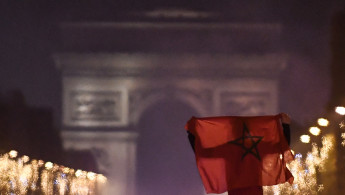Morocco braces for World Cup duel with ex-colonial rulers France
The Morocco national football team reached unexpected heights on Saturday by advancing to the FIFA World Cup semi-finals, where they will face France.
The semi-final match is already high stakes in a sporting sense, as defending champions France look to replicate their success of four years ago while the Atlas Lions try to break even more ground for African and Arab football.
But some World Cup fans also await Wednesday's showdown for historical reasons, hoping to see Morocco beat France as retribution for the European nation's colonial rule of the North African country.
if Morocco play and beat France next week then we’ve sent every nation that’s ever colonised us home pic.twitter.com/RsmOyI8GeJ
— Soraya Bouazzaoui 🇲🇦 (@halalltakeaway) December 10, 2022-
France occupied parts of Morocco for more than four decades, until Rabat gained independence in 1956. The occupation saw several launched bids for independence, as well as the exile of King Mohammed V to Madagascar.
French language and culture maintain a grip on Moroccan society. A third of the population is fluent in French, and political and economic ties between the two countries remain loaded.
|
The North African team's path to the semi-finals has already been historically weighty. In their five matches in the tournament so far, Morocco has faced two of its former colonisers - Spain and Portugal.
Spain colonised northern parts of the country along the Mediterranean coast including the city of Tetouan, as well as what is known today as the disputed territory of Western Sahara. The occupation saw several battles, including the Rif War lasting from 1921 to 1926. Today, the Spanish language serves as a second and third language in the previously-occupied regions.
Tensions between the two countries persist, largely over Ceuta and Melilla, cities enslaved by mainland Morocco but claimed by Spain.
Portugal began occupying parts of Morocco following the expansion of its empire in 1415.
The Portuguese largely took control of strategically-placed coastal towns, including Agadir, Essaouira and El Jadida. The Moroccan reconquest of its territories began in the mid-16th century, and went on until 1769.
In the group stages, Morocco also brushed aside Belgium, who never formally colonised the North African kingdom but were a former co-administrator of the Tangier International Zone, which served as a 'neutral' region under several European countries' administration between 1924 and 1956.
Morocco 🇲🇦 took down 3 colonial European nations in 10 days.
— Khaled Beydoun (@KhaledBeydoun) December 11, 2022
Belgium 🇧🇪
Spain 🇪🇸
Portugal 🇵🇹
If they defeat France 🇫🇷—they’ll win something bigger than the WorldCup; the hearts of formerly colonized people everywhere.
France, Spain, Belgium and a host of other European nations are all home to sizeable Moroccan diaspora communities, who mostly immigrated for economic reasons in the decades following independence.
Much of Morocco’s squad were born in Europe, including Spain-born Achraf Hakimi and France-born Sofiane Boufal and Romain Saiss.
Coach Walid Regragui, hailed a hero for his efforts with the team, was also born and raised in France, and expressed desire to face what he called his "second country" in the semi-finals.





 Follow the Middle East's top stories in English at The New Arab on Google News
Follow the Middle East's top stories in English at The New Arab on Google News


